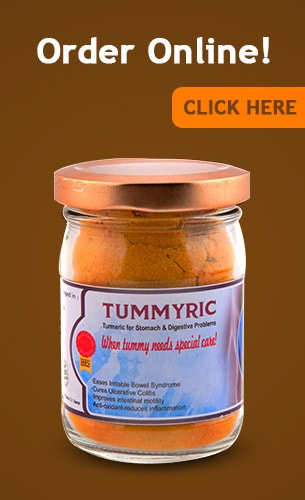Healthy Gut With The Richness Of Curcumin

BID GOODBYE TO A TROUBLED TUMMY
The brain and the gastrointestinal system are intimately connected. Ever wondered why at the very thought of food, salivation occurs? The nerves that control saliva production are part of a reflex system. The smell, taste or even thought of food can activate this reflex. The part of the brain responsible for this salivary reflex is the medulla oblongata which controls a variety of functions from sneezing to vomiting. On receiving these stimuli, the medulla oblongata sends neurotransmitters to the glands to produce the saliva.
A troubled intestine, in turn can send signals to the brain, just as a troubled brain can send signals to the gut. Therefore, a person’s stomach or intestinal distress can be the cause or the product of anxiety, stress, or depression. This Gut-Brain connection is something to ponder on, especially since we tend to shrug off digestion-related issues as being ordinary.
From time to time we have suffered from numerous stomach- related disorders like heart burn, nausea, acid reflux, diarrhea, flatulence, Irritable Bowel Syndrome etc. As much as we love avoiding these, they are inevitable. The genesis of this problem can be attributed to a weak digestive system caused by bacterial infection, viral infection, inflammation, lactase deficiency, difficulty digesting certain foods, poor circulation to the intestines or other organs, ruptured or perforated organs, muscle dysfunction, gallstones, stress, and side effects of anti-inflammatory drugs. Dietary factors include overeating, eating too much fatty food, not consuming enough fiber, less consumption of water and consuming too much alcohol. Smoking can also contribute to some digestive diseases, including ulcers and gastric acid reflux.
Some digestive disorders are serious and long-lasting while others resolve in a few days without permanent effects. However, the discomfort caused can be a problem. Here are a few common causes of digestive disorders:
Food allergies and food intolerance: Certain foods can cause allergic reactions, including the swelling of the lips, mouth, the back of the throat. They can also lead to nausea and vomiting, but this will take longer to develop. Abdominal pain can also be caused by food intolerance.
Poor diet: A diet high in fatty, fried and sugary foods and low in fiber can cause stool to pass more slowly through the colon. Inadequate water intake can also lead to constipation, and this can contribute to many other digestive disorders.
Viral or bacterial infection: Bacteria, viruses and parasites can get into the digestive system by means of contact with contaminated surfaces, or contact with infected stools and then ingesting the germs or from eating infected food or drinking infected water.
Inflammation and auto-immune diseases: These disorders, in which the immune system attacks and harms the body’s own tissues, can involve any part of the digestive system.
Auto-immune diseases that affect the digestive tract include systemic lupus erymathosus, rheumatoid arthritis, Sjögren’s Syndrome and scleroderma, to name but a few. Systemic autoimmune diseases cause a variety of gastro-intestinal problems.
Structural causes: A structural abnormality in the digestive system (such as the pouches that develop in the intestines of someone with diverticulosis) can hamper the working of the digestive system. An ulcer in the stomach lining or the intestines would be another example, as would be a cancerous tumour.
Genetic causes: Some digestive diseases are thought to be hereditary. These include colon cancer, Crohn’s disease, diabetes type 1, pancreatic cancer, hypothyroidism, cystic fibrosis, coeliac disease and some liver diseases.
Lifestyle choices: Constant high stress levels, a lack of exercise, smoking, and drinking can all affect the digestive system.
Medication side effects: Many medicines, such as certain antibiotics and non-steroidal anti-inflammatories and certain diabetes medications, to name but a few, can have side effects that involve the digestive system. Nausea, diarrhoea, ulceration and constipation count among these.
Cancer: Gastro-intestinal cancer is term for the group of cancers that affect the digestive system, says the GI Cancer Institute. This includes cancers of the throat, gallbladder, liver, pancreas, stomach, small intestine, large intestine and anus. Cancer is a malignant growth or tumour caused by an uncontrolled division of cells, which can spread into surrounding tissues.
Functional problems: Very commonly people+- experience symptoms related to the gastro-intestinal system, but all the tests are normal. This can be frustrating to both patient and doctor, because it is difficult to treat. Irritable bowel syndrome is one of these functional disorders. The tests usually exclude other serious diseases such as cancer, but the symptoms often affect the patient’s quality of life.
Ageing: Unfortunately the gastrointestinal system ages with the rest of our bodies. Our saliva decreases, taste is affected, reflux gets worse, motility if affected etc.
Systemic diseases: Many systemic diseases affect our gastrointestinal system, such as autoimmune diseases (i.e. scleroderma that affects the motility of the gut), heart failure (the chronic congestion can cause liver cirrhosis), genetic diseases, HIV and diabetes.
No matter the cause or innumerable problems, nature has its own cure: Curcumin
Curcumin is a component of the Indian spice turmeric (Curcumin longa), a type of ginger. Curcumin is one of three curcuminoids present in turmeric which give it the trademark yellow color. The potent compound Curcumin relieves the underlying issues of acid and bile overproduction, thereby promoting benefits to the body instead of painful conditions and helping to produce good bacteria, minimize bad bacteria, and improve the colon’s ability to absorb beneficial nutrients. Curcumin also reduces inflammation, reduces abnormal muscle movements, and soothes digestive issues.
In order to treat digestive problems,it is very important to use pure,oraganic,chemical-free Curcumin.There will be claims aplenty but only a few brands actually sell the real thing. Tummyric is a product of Bagdara Farms, which has high levels of Curcumin, grown organically, is free of pesticides and harmful chemicals.
Jean Jacques-Rousseau quoted “Happiness: a good bank account, a good cook and a good digestion.” Curcumin can help you with digestion so you can go build yourself a good bank account and manage a good cook!


